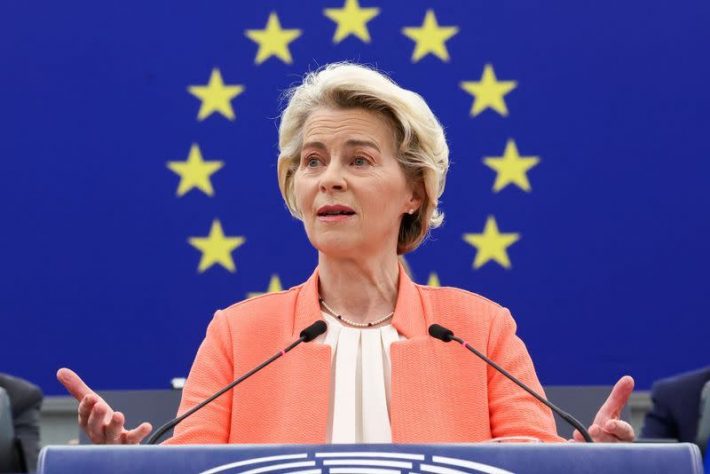The European Commission said on Wednesday it has launched an investigation into Chinese state subsidies for electric vehicles – and whether to impose tariffs to protect local carmakers.
The move follows intense concern and months of debate over the “invasion” of Chinese electric vehicles that has poured into Europe recently.
There is fear that China’s subsidies for electric vehicles are distorting the market in the European Union and threatening the continent’s production of EVs.
ALSO SEE: Kim Jong Un in Russia ‘For Talks on Arms, Tech and Food’
Commission President Ursula von der Leyen, who announced the probe on Wednesday, noted the importance of electric vehicles to the EU’s ambitious environmental objectives, but said the world is awash with cheap Chinese vehicles.
“Global markets are now flooded with cheaper electric cars. And their price is kept artificially low by huge state subsidies,” Von der Leyen said in her annual address to the bloc’s parliament.
European carmakers have realised they have a fight on their hands to produce lower-cost electric vehicles and erase China’s lead in developing cheaper, more consumer-friendly models.
Brussels has been under pressure to impose restrictions on EVs from China because of concerns that such imports are arriving in Europe on a scale that threatens Europe’s domestic production of such vehicles.
Chinese EV makers are stepping up efforts to expand overseas markets as competition intensifies at home and domestic growth eased. China’s auto exports surged 31% in August following a 63% jump in July, according to the China Passenger Car Association (CPCA).
Carmakers such as BYD, Great Wall and Ora have all launched a sales drive in Europe this year and reportedly gained quick shares of the market. BYD’s Atto-3 was the best-selling EV in Sweden in July, for example.
Of new EVs sold in Europe this year, 8% were made by Chinese brands, up from 6% last year and 4% in 2021, according to autos consultancy Inovev.
Shares of Chinese EV producers fell after the EU announcement. BYD shares were trading 4.5% higher before the news, but closed down 2.8%. Nio fell 1% and Xpeng dropped 2.5%.
In April, the founder of Nio said that Chinese electric vehicle makers should brace for the possibility of protectionist policies against them by foreign governments as they seize on their cost advantages to expand exports.
He estimated his company and other Chinese EV makers had a cost advantage of around 20% over rivals such as Tesla thanks to China’s grip over the supply chain and raw materials.
Concern over tit-for-tat tariff war
The Commission’s trade defence unit, led by Denis Redonnet, has been in talks for several months on whether to launch an investigation that could allow the EU to impose additional levies or an anti-dumping and anti-subsidy investigation, on such cars, Politico revealed in June, citing senior officials.
China uses vast subsidy programmes for industries that Beijing believes can become global champions. But, it said, there has been disagreement in the EU on how to respond to the problem without causing a tariff war that affects European cars sold in China.
The EU can restrict imports from outside the Union if its trade department finds that certain products have been subsidized or are being sold below cost and are destroying EU industry.
A key response came last month, when the European Commission imposed a Batteries Regulation to ensure that EV batteries are collected, reused and recycled in Europe.
The EC said on August 17 that it wants batteries to have a low carbon footprint, to use minimal harmful substances, and batteries that need less raw materials from non-EU countries.
It will cost more if you shut us out, China says
China has followed these developments closely and acknowledged that “concerns are rising” about Chinese electric cars and batteries entering the European market.
But it has essentially advised that countries, or regions, that shut Chinese batteries out for geopolitical reasons, or fear of competition, are likely to end up with domestic companies making EVs that will be more expensive and slower to develop because of insufficient domestic supplies.
The Global Times state-media outlet reported yesterday (Sept 12) that Britain would not impose import restrictions on batteries for electric vehicles from China, implying that this was a sensible response to EV trade concerns.
It quoted UK Trade Minister Kemi Badenoch as saying on Monday: “At the moment, China is leading on this technology, so we wouldn’t be able to get to where we want to get to on Net Zero by completely stopping or banning Chinese products … You can’t exclude Chinese-made products from the battery ecosystem.”
It also noted that the UK has “rule of origin” requirements that come into force in 2024 under the EU-UK post-Brexit trade deal and that “carmakers could face tariffs of 10% on EV exports to the EU if at least 45% of the value of an electric car’s components and 60% of its battery don’t come from the UK or EU.”
The report emphasized that Chinese companies had been found to account for more than half of the EV battery market and up 90% of demand for some battery materials.
And it claimed that “Chinese manufacturers, especially those on the battery-supply chains, have already shifted from being entirely subsidy-driven to being market-driven”.
It urged the EU “to follow rational voices” on whether it is conducive to promoting green development, “rather than being derailed by protectionism or geopolitics that will only backfire”.
- Jim Pollard with Reuters
NOTE: The headline on this report was amended and further detail added to the text on Sept 13, 2023.
ALSO SEE:
China EV-Makers Start Steady in Europe Amid Cost, Trust Issues
Chinese EV ‘Invasion’ Forces Western Rivals to Slash Costs
US Checking EV Battery Imports Over China Forced Labour Fears
Volkswagen Buys $700 Million Xpeng Stake to Lift China EV Share
China’s CATL Posts Record Profit Even As Slowing Demand Bites
























